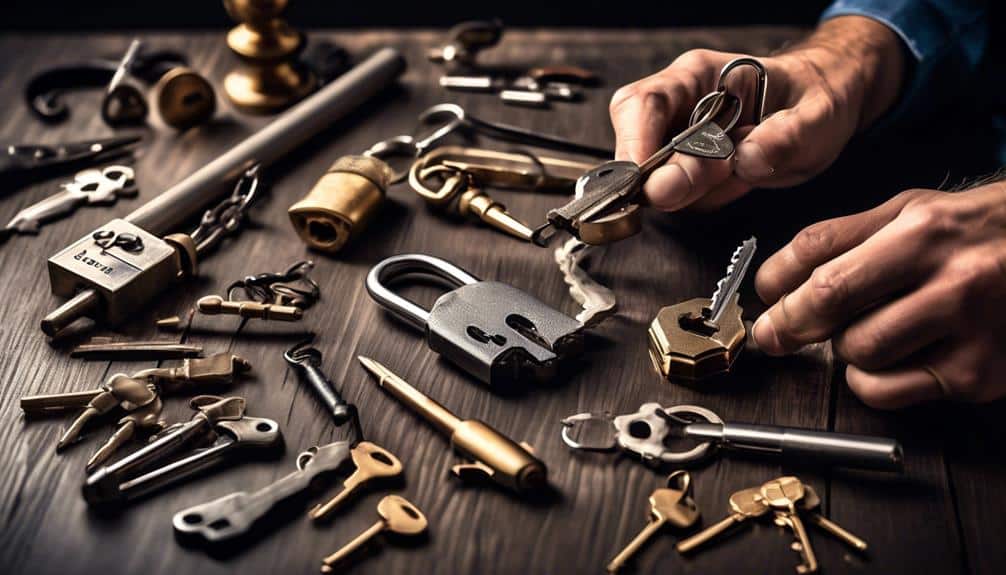Did you know that damaged locks are a locksmith's specialty? When it comes to securing your home or business, locks are an essential line of defense. However, over time, locks can become worn out, rusted, or even broken.
This can not only compromise the security of your property, but it can also be incredibly frustrating. But fear not, because locksmiths are experts in fixing damaged locks and ensuring the safety of your premises.
So, why exactly are damaged locks their specialty? Well, let's dive into the world of locksmiths and uncover the reasons behind their expertise in repairing and replacing locks.
Common Causes of Lock Damage
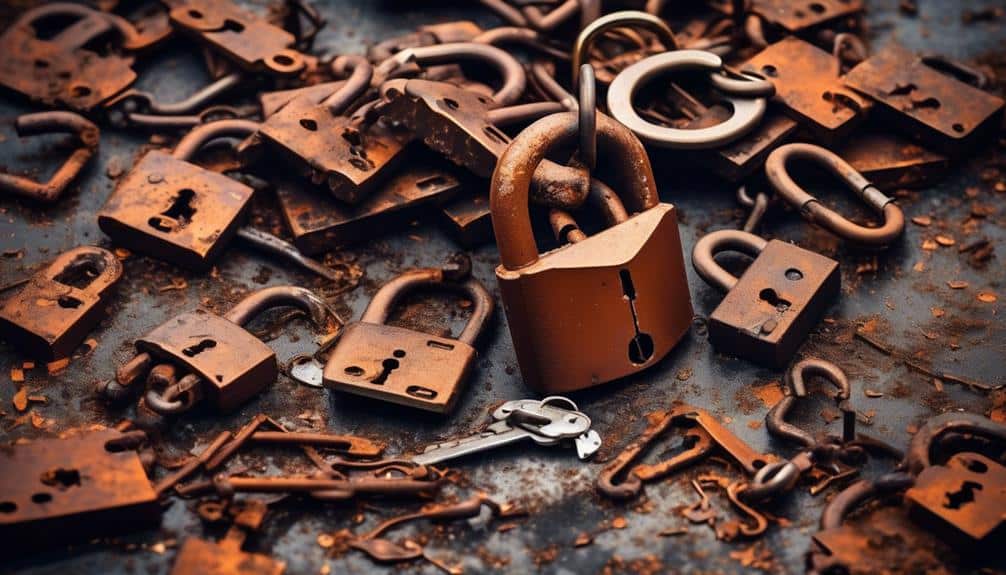
Locks can become damaged due to a variety of factors, ranging from everyday wear and tear to deliberate tampering. Understanding the common causes of lock damage is crucial for preventing potential security breaches and ensuring the longevity of your locks.
One of the primary causes of lock damage is excessive force. When a key is forced into a lock or a door is slammed shut with too much force, it can lead to misalignment of the lock components, resulting in a malfunctioning lock.
Another common cause is the use of improper keys. Using the wrong key or attempting to force a key into a lock that it doesn't fit can damage the internal mechanisms, rendering the lock useless.
Additionally, exposure to harsh weather conditions such as extreme heat or cold can cause locks to deteriorate over time.
To prevent lock damage, it's essential to handle keys and locks with care, avoid using excessive force, and ensure that the correct key is always used. Regular maintenance, such as lubricating the lock and cleaning out debris, can also help prevent lock damage and extend the lifespan of your locks.
Signs of a Damaged Lock
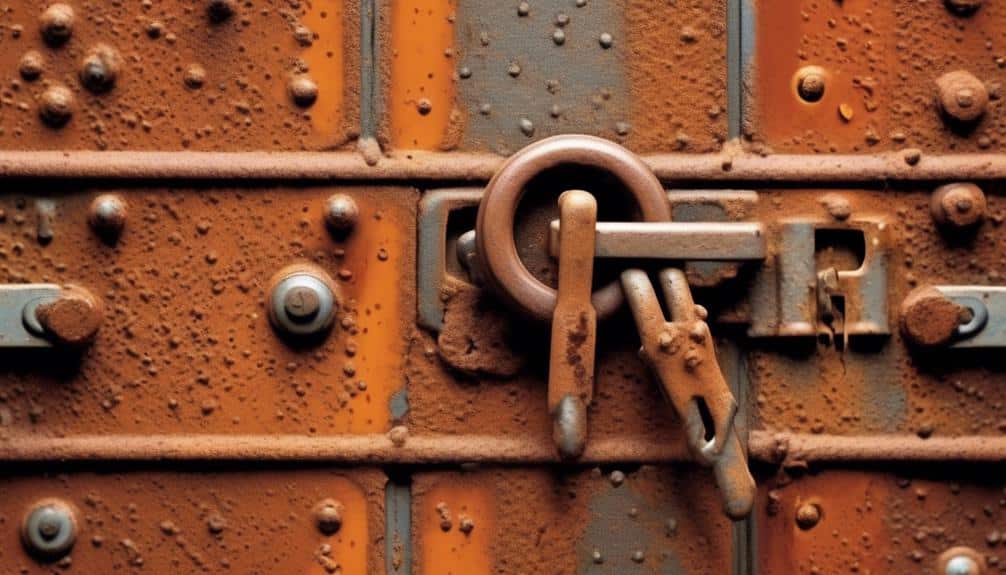
If your lock shows visible signs of wear and tear, such as rust or chipped paint, it may be an indication of damage.
Additionally, if you find it increasingly difficult to turn the key in the lock, this could also be a sign of damage.
These are important indicators that your lock may need to be repaired or replaced to ensure the security of your property.
Visible Wear and Tear
Visible wear and tear on a lock can provide crucial indications of its damage and potential vulnerabilities. One of the most common signs of wear and tear is rust damage. Rust occurs when moisture comes into contact with metal, causing it to corrode. This corrosion weakens the lock, making it easier for intruders to tamper with or break.
Additionally, visible wear and tear can also affect the lock's aesthetic appeal. Scratches, dents, or chipped paint can make a lock appear old and neglected, which may attract unwanted attention from potential burglars.
It's important to address visible wear and tear promptly to ensure the lock's functionality and to maintain the overall security of your property. Regular maintenance and repair by a professional locksmith can help prevent further damage and ensure that your locks remain in good working condition.
Difficulty in Turning
One telltale sign of a damaged lock is when you encounter difficulty turning the key or handle. This difficulty in turning can stem from various issues within the lock mechanism. It could be due to worn-out or misaligned components, rust or debris accumulation, or even internal damage caused by attempted break-ins.
Ignoring a damaged lock can have serious consequences, such as compromising the security of your property or making it easier for intruders to gain access. Moreover, attempting to repair a lock without the necessary expertise can further exacerbate the problem and lead to additional damage.
It's crucial to seek professional help when faced with difficulty in lock repair to ensure the problem is properly addressed and your security isn't compromised.
Importance of Timely Lock Repair

Timely lock repair is crucial to maintain the security and functionality of your locks. Neglecting lock repairs can have serious consequences, compromising the safety of your property and leaving you vulnerable to theft or break-ins. It is important to address any issues with your locks promptly to avoid these risks.
To illustrate the importance of timely lock repair, let's take a look at the potential consequences of neglecting lock maintenance.
| Neglected Lock Maintenance | Consequences |
|---|---|
| 1. Worn or damaged locks | Easy target for burglars |
| Inability to properly secure property | |
| 2. Stuck or jammed locks | Difficulty in accessing your own property |
| Increased frustration and inconvenience | |
| 3. Broken key in lock | Complete lock failure |
| Need for costly lock replacement |
As you can see, neglecting lock repairs can lead to a variety of problems. From making your property an easy target for burglars to causing inconvenience and frustration, the consequences are significant. By addressing lock issues in a timely manner, you can ensure the security and functionality of your locks, providing peace of mind and convenience.
Tools Used for Lock Repair
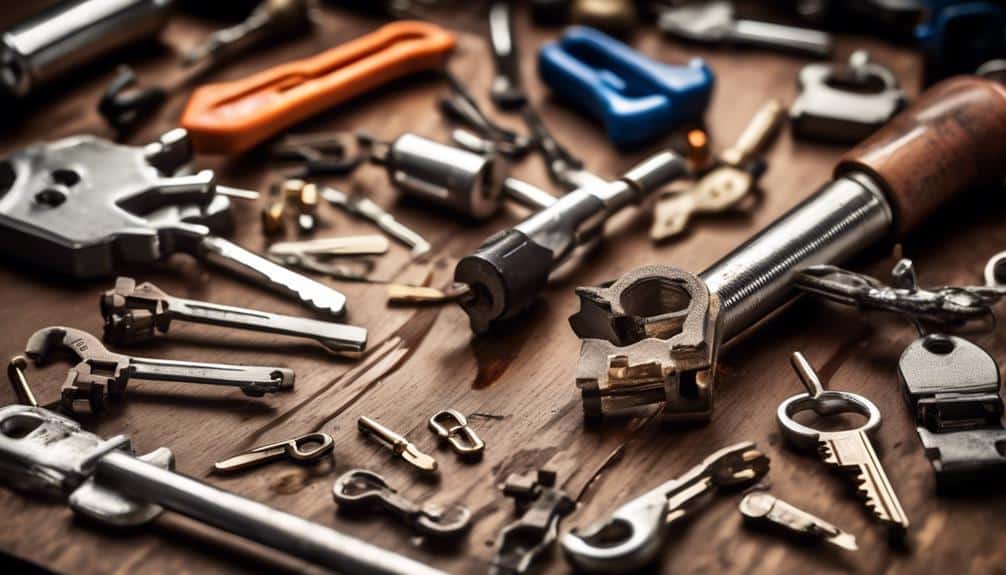
When it comes to lock repair, a locksmith relies on a set of essential tools. These tools are specifically designed to address common lock problems such as jammed or broken locks.
Locksmith's Essential Tools
Locksmiths rely on a wide array of essential tools when repairing locks, ensuring efficient and effective service. These tools are specifically designed to tackle various lock-related issues and allow locksmiths to showcase their expertise in lock maintenance.
Here are three essential tools that every locksmith should have in their toolkit:
- Lock Pick Set: A lock pick set consists of different types of picks and tension wrenches which are used to manipulate the lock's pins and springs to open it without damaging the lock mechanism. Locksmiths use their skill and knowledge to choose the right pick and technique for each lock.
- Key Extractor Tool: This tool is used to remove broken or stuck keys from locks. It features a long, slim design with hooks or teeth that can grip the key fragment and safely extract it from the lock cylinder.
- Plug Spinner: A plug spinner is used to rotate the lock's plug in the opposite direction to its normal operation. It's especially helpful when dealing with locks that have been picked or manipulated, allowing locksmiths to quickly unlock the door without needing to re-pick the lock.
Common Lock Problems
To effectively address common lock problems, locksmiths rely on a specific set of tools designed for lock repair and maintenance. These tools enable them to troubleshoot and resolve various issues that may arise with locks. Here is a table showcasing some common lock problems and the corresponding tools used for their repair:
| Common Lock Issues | Tools Used for Repair |
|---|---|
| Key stuck in the lock | Key extractor tool |
| Jammed lock mechanism | Lubricant spray, lock pick set, tension wrench |
| Broken key in the lock | Key extractor tool, broken key extractor set |
| Misaligned door latch | Screwdriver, pliers |
| Loose or wobbly doorknob | Screwdriver, Allen wrench |
Fixing Damaged Locks
To repair damaged locks, locksmiths utilize a specialized set of tools designed specifically for lock repair and maintenance. These tools enable locksmiths to effectively diagnose and fix various issues that may arise with locks. Here are three essential tools used for lock repair:
- Locksmith Hammer: A locksmith hammer is a lightweight and durable tool used to carefully tap and align lock components. It helps in fixing misaligned or loose parts without causing further damage.
- Plug Spinner: A plug spinner is a crucial tool used to rotate the lock cylinder in the opposite direction of its normal operation. This tool is employed to fix locks that have been picked or tampered with, allowing the locksmith to reset the lock mechanism.
- Broken Key Extractor: When a key breaks inside a lock, a broken key extractor comes to the rescue. This tool enables locksmiths to safely remove the broken key piece without causing damage to the lock itself.
Steps to Repair a Damaged Lock
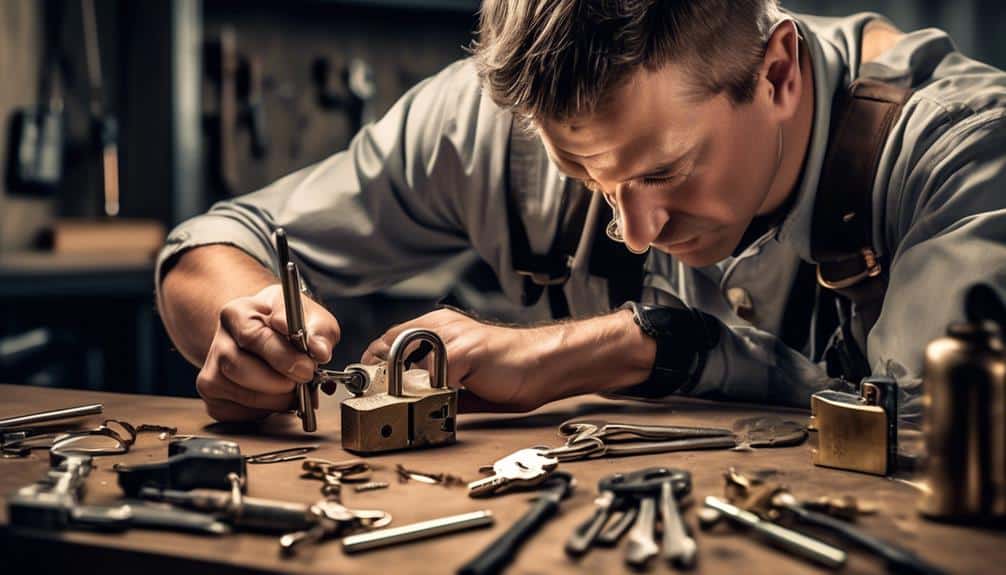
When repairing a damaged lock, it's important to carefully assess the extent of the damage before proceeding with any repairs. This will help you determine the best course of action and ensure that the lock is fixed properly.
The lock repair process can vary depending on the type of damage, but here are some DIY lock repair tips to help you get started.
First, gather the necessary tools for the job. You'll need a screwdriver, pliers, lubricant, and replacement parts if necessary. Once you have the tools ready, begin by removing the lock from the door. This will allow you to access the inner components and identify the cause of the damage.
Inspect the lock cylinder for any signs of wear or damage. This is often the most common issue that needs to be addressed. If the cylinder is damaged, you may need to replace it. Remove the old cylinder and install the new one according to the manufacturer's instructions.
If the lock is sticking or not working smoothly, lubricate the internal components with a few drops of lubricant. This will help to reduce friction and improve the lock's functionality. Be sure to use a lubricant specifically designed for locks to avoid causing any further damage.
Once you have completed the necessary repairs, reinstall the lock on the door and test it to ensure that it's functioning properly. If you encounter any difficulties or the lock is still not working correctly, it may be best to consult a professional locksmith for further assistance.
Benefits of Hiring a Professional Locksmith for Lock Repair
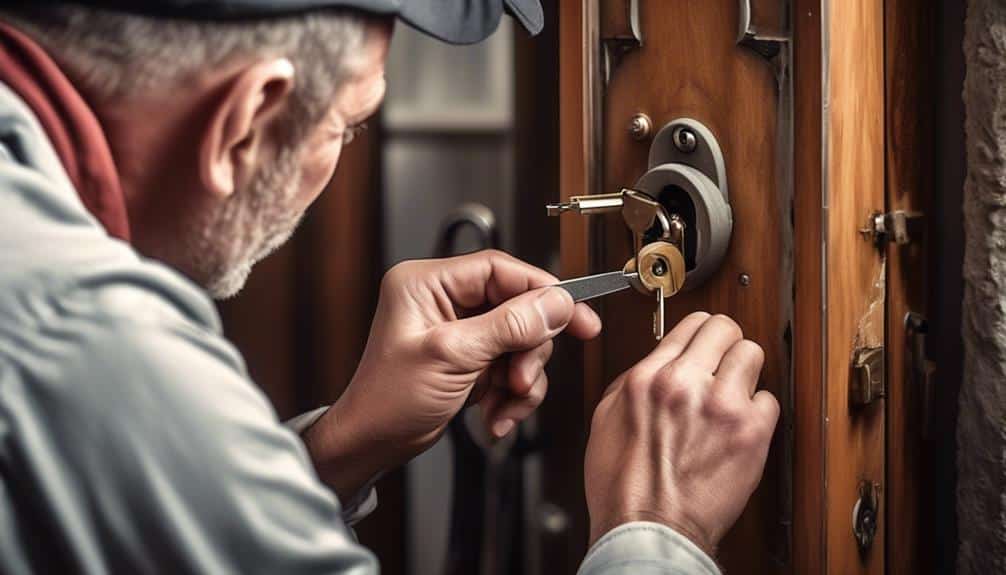
If you want to ensure that your damaged lock is repaired properly and efficiently, hiring a professional locksmith is the best choice. Here are three benefits of hiring a professional locksmith for lock repair:
- Expertise and Knowledge: Professional locksmiths have extensive knowledge about different types of locks and their mechanisms. They're trained to identify the root cause of the lock damage and have the skills to repair it effectively. With their expertise, they can quickly assess the problem and provide the most suitable solution.
- Specialized Tools and Equipment: Locksmiths use specialized tools and equipment that are specifically designed for lock repair. These tools allow them to complete the repair work efficiently and with precision. They've access to a wide range of tools, including lock pick sets, lock rekeying kits, and key extractors, which are essential for repairing damaged locks.
- Time and Cost Savings: Hiring a professional locksmith for lock repair can save you both time and money. With their expertise and specialized tools, they can quickly diagnose and fix the lock issue, saving you from the hassle of trying to repair it yourself. Additionally, professional locksmiths can provide cost-effective solutions, such as repairing the lock instead of replacing it, which can help you save money in the long run.
Frequently Asked Questions
How Much Does Lock Repair Usually Cost?
Lock repair costs can vary depending on several factors. The cost of locksmith services can be influenced by the type of lock, the extent of the damage, and the time required for the repair. Prices typically range from $50 to $200, but this is just an estimate.
It's best to contact a locksmith for an accurate quote. Remember, the cost may also include any additional parts needed for the repair.
Are Damaged Locks Covered by Homeowners' Insurance?
Is lock repair covered by insurance?
If you have homeowners' insurance, it's possible that damaged locks may be covered under certain circumstances.
To file a claim for damaged locks, you should contact your insurance provider and provide them with the necessary documentation, such as proof of the damage and a locksmith's estimate for repair or replacement.
Keep in mind that coverage may vary depending on your specific policy and the cause of the damage.
Can a Damaged Lock Be Repaired, or Does It Need to Be Replaced?
When it comes to damaged locks, you may wonder if they can be fixed or if they need to be replaced. Well, repairing a damaged lock is possible, but it's not always the best option. Sometimes, replacing the lock can offer more benefits.
Locksmiths specialize in understanding the intricacies of locks and can assess the damage to determine the best course of action. So, whether it's repairing or replacing, trust a locksmith to handle your damaged lock with expertise.
How Long Does It Typically Take to Repair a Damaged Lock?
On average, lock repair techniques can take anywhere from 30 minutes to a few hours, depending on the extent of the damage. Locksmiths utilize their expertise to efficiently diagnose and fix the problem.
They may need to disassemble the lock, replace damaged components, or rekey it. The repair time also depends on the availability of the necessary tools and parts.
Is It Possible to Prevent Lock Damage in the First Place?
To prevent lock damage, it's essential to follow some lock maintenance tips. Regular lock inspections are crucial for identifying and addressing potential issues.
Make sure to lubricate the lock mechanism periodically to keep it functioning smoothly. Avoid using excessive force or inserting foreign objects into the lock.
If you notice any signs of damage or wear, call a professional locksmith immediately. Taking these precautions can help you avoid lock damage and ensure the security of your property.

